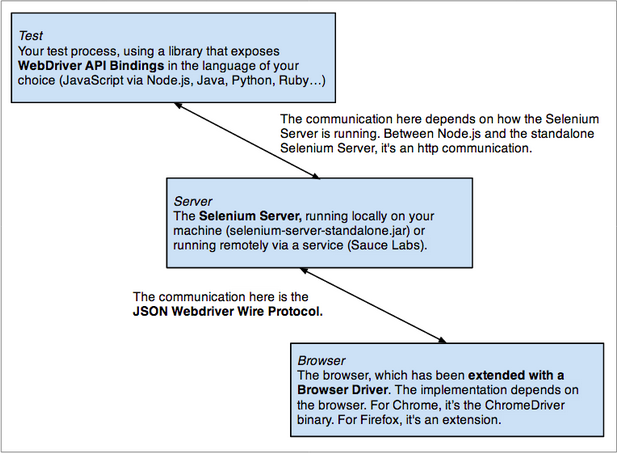Protractor over Selenium In Automation testing
Posted By : Sumit Vats | 08-Jan-2021
Hi QA folks, here we'll see what's Role of Protractor over Selenium in Automation testing.
Protractor is an end-to-end test framework available for developers for AngularJS applications. Protractor is a program in the Node.js language that extends support to the Jasmine and Mocha test frameworks.
Selenium is a browser automation framework. It comprises the Selenium Server, the WebDriver APIs, and the WebDriver browser drivers.
Protractor and Selenium work together to provide an automated test infrastructure. Together they can be used to simulate a user’s interaction with an Angular application running in a browser or mobile device.

You should keep the following points in mind when you are working with Protractor:
- Protractor works like an envelope for WebDriverJS which is the JavaScript bindings for the Selenium WebDriver API (before writing any tests, take a look at WebDriverJS Users Guide).
- WebDriver commands are asynchronous and are scheduled on a control flow and return promises. They are not scheduled on primitive values (see The WebDriver Control Flow)
Also Read: How to Perform Cross Browser Testing using Selenium
Process Communication
Tests performed using the Selenium WebDriver consists of three processes. They are the test script, the server, and the browser.
You can see in the diagram below how the communication between these processes happens.

The Selenium Server interprets the commands from the test and forwards them to one or more browsers. Communication between the server and the browser uses the WebDriver Wire Protocol, a JSON protocol. Browser Driver interprets this command.
Also Read: The Significance of WebElement In Selenium
Key differences:
| Comparison Basis | Selenium | Protractor |
| Supported Front End Technology-Based Web Application | Supports all front end technology | Specially designed for Angular and AngularJS applications, but can be used for Non-angular applications also. |
| Supported Languages | C#, Java, Haskell, Perl. PHP, JavaScript, Objective-C, Ruby, Python, R | JavaScript and TypeScript. |
| Supported Browsers | Chrome, Firefox, Internet Explorer ( IE), Microsoft Edge, Opera, Safari, HtmlUnitDriver | Chrome, Firefox, Internet Explorer ( IE), Microsoft Edge, Safari |
| Synchronization or Waiting | Does not support automatic synchronization between tests and application. Explicit synchronization is required using different waits. | Angular applications get the support of automatic wait. Non-angular applications do not get it. However, you have the facility of explicitly synchronizing waits in Protractor. |
| Supported Locators Strategies | Supports common locator strategies like Id, className, linkText, XPath, partial link text, name, tagName, and CSS for all web applications | Supports common locator strategies like Id, className, name, linkText, tagName, partial link text, XPath, and CSS for all web applications plus it also supports angular specific locator strategies such as model, repeater, binding, buttonText, option, etc. also permits the creation of custom locators. |
|
Supported Test Frameworks |
Selenium supports various Test Frameworks based on the language binding C#- NUnit, |
Protractor aids Jasmine and Mocha. Jasmine is the default framework in Protractor. |
| Support for BDD | Yes. (Serenity, Cucumber, JBehave, etc). | Yes. Mocha, Jasmine, Cucumber, and Serenity/JS |
| Reporting | Requires third-party tools:- TestNG, Extent Report, Allure Report, etc. | Requires third-party tools:- protractor-beautiful-reporter, protractor-HTML-reporter etc |
| Managing browser drivers | Requires third-party tools like WebdriverManager to sync browser version and driver. | To automatically sync between browser version and driver for Chrome and Firefox, Protractor requires the web driver-manager CLI. |
Also Read: Top Five Smartphone Testing Strategies
Learn More
Learn more with the Tutorial.
Why Choose Oodles Technologies For DevOps Solutions?
We are seasoned DevOps solutions and service providers with vast experience in providing full-scale DevOps solutions for varied business requirements. Our team of DevOps professionals formulates effective strategies to strengthen your enterprise IT infrastructure and enhance operational efficiency. Our 360-degree DevOps solutions and services accelerate the software development lifecycle and ensure faster delivery with continuous deployment. For project related queries, reach us out at [email protected]
Cookies are important to the proper functioning of a site. To improve your experience, we use cookies to remember log-in details and provide secure log-in, collect statistics to optimize site functionality, and deliver content tailored to your interests. Click Agree and Proceed to accept cookies and go directly to the site or click on View Cookie Settings to see detailed descriptions of the types of cookies and choose whether to accept certain cookies while on the site.










About Author
Sumit Vats
Sumit is highly dedicated QA engineer with experience in manual and automation testing. He is enhancing his skill with new technologies and add value to the organisation by his work.